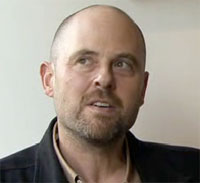
 The Edge Foundation has posted a video interview with Alva Noë, Professor of Philosophy at UC-Berkeley, on the problem of consciousness. From the Web site:
The Edge Foundation has posted a video interview with Alva Noë, Professor of Philosophy at UC-Berkeley, on the problem of consciousness. From the Web site:The problem of consciousness is understanding how this world is there for us. It shows up in our senses. It shows up in our thoughts. Our feelings and interests and concerns are directed to and embrace this world around us. We think, we feel, the world shows up for us. To me that's the problem of consciousness. That is a real problem that needs to be studied, and it's a special problem.A useful analogy is life. What is life? We can point to all sorts of chemical processes, metabolic processes, reproductive processes that are present where there is life. But we ask, where is the life? You don't say life is a thing inside the organism. The life is this process that the organism is participating in, a process that involves an environmental niche and dynamic selectivity. If you want to find the life, look to the dynamic of the animal's engagement with its world. The life is there. The life is not inside the animal. The life is the way the animal is in the world.
What is at issue is whether we can apply an objective causal model to explain our subjective conscious states to meaningfully explain the mystery of consciousness.


2 comments:
Pretty vague. Rather than "the way" the animal is in the world, the animal's life is its activity in the world. No activity, no life. Consciousness as well is better understood as a verb than a noun.
I beg to differ with Dr. Noe.
/cue James Bond music
I have a vested interest in consciousness, and I agree that neuroscience and cognitive psychology must be aware (ha!) of the necessary philosophical assumptions that they make, but there is *a lot* of evidence that consciousness is epiphenomenal.
Benjamin Libet's studies show that the physical mechanism of consciousness (neural pathways) fire *before* awareness occurs (e.g., in making a decision - our brain makes up our mind before we're aware of making a choice). Neuroscience tells us that particular regions are associated with emotional valencing of memory - a key part of decision-making (see Damasio's Descartes' Error). One of Damasio's key findings is that individuals who ignore things like emotion and intuition make objectively worse decisions (i.e., they don't learn from visceral memories of past mistakes - suck it, Kant). We see *radical* shifts in personality following grievous injury, as in the case of Phinneus Gage, who prior to having a three-foot iron bar blasted through his head was responsible, dependible, and a real "go-to" guy. Following his accident, he was reckless, impulsive, and unable to hold a job. He sustained damage to his left orbitofrontal cortex, which is involved in impulse control and planning.
We also see evidence of a number of avolitional processes influencing cognition, like cognitive heuristics. Our brains are like muscles, in that once they are trained (i.e., particular neural pathways are consistently reinforced), they are reinforced and fire more frequently (called the Hebb rule). Additionally, we see issues in personal identity - our earliest memories tend to be those from childhood which are tied to strong emotions (e.g., fearful memories, angry memories, etc.), but typically only start at least a year after we are born. All of this points to the physical "stuff" of the brain existing prior to the development of consciousness, specifically more advanced structures in the telencephalon (frontal, occipital, parietal, temporal lobes and secondary association cortices).
Last, there is a significant body of knowledge in psychology regarding non- and unconscious thought. Associational processes, data parsing and elimination, neural pathway development, etc., are all nonconscious, avolitional processes. We are only aware of surface phenomena, and can only hold a handful of ideas in our heads at once (8-10, tops), leaving the rest to roil beneath the surface. Consciousness would seem to "bubble up". As such, instead of dancing, consciousness is more like making soup - once it gets boiling, we only see the surface, not the underlying activity.
Consciousness seems to be more of a system attribute, rather than a component attribute. Once organisms reach a sufficient level of neural complexity, we see self-identity behaviors (e.g., recognition of self in mirrors has been observed in great apes and dolphins, but not in cats, dogs, or goldfish).
So color me skeptical on his line of analysis.
Post a Comment